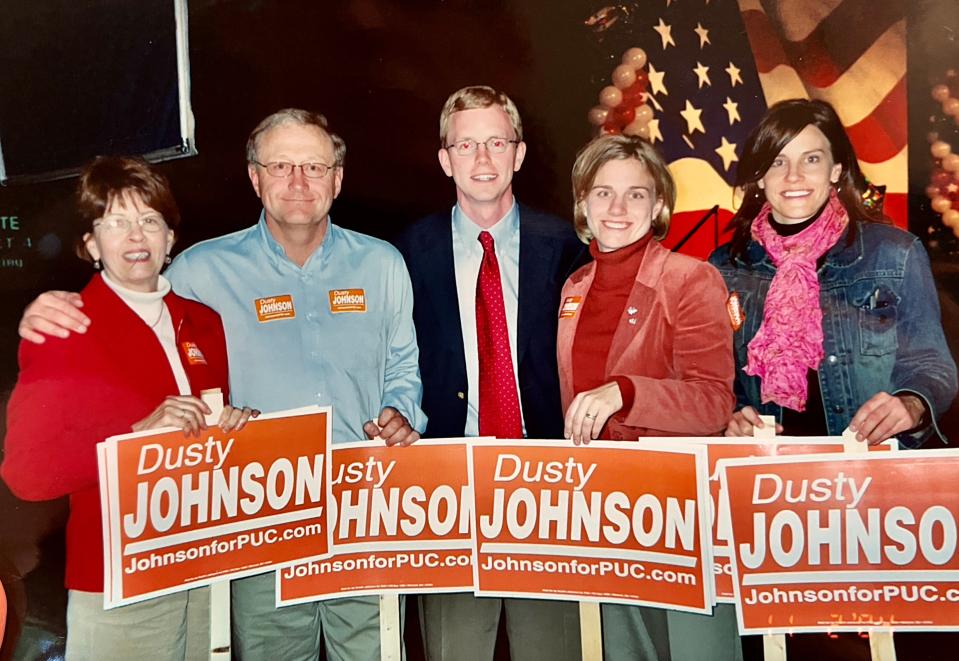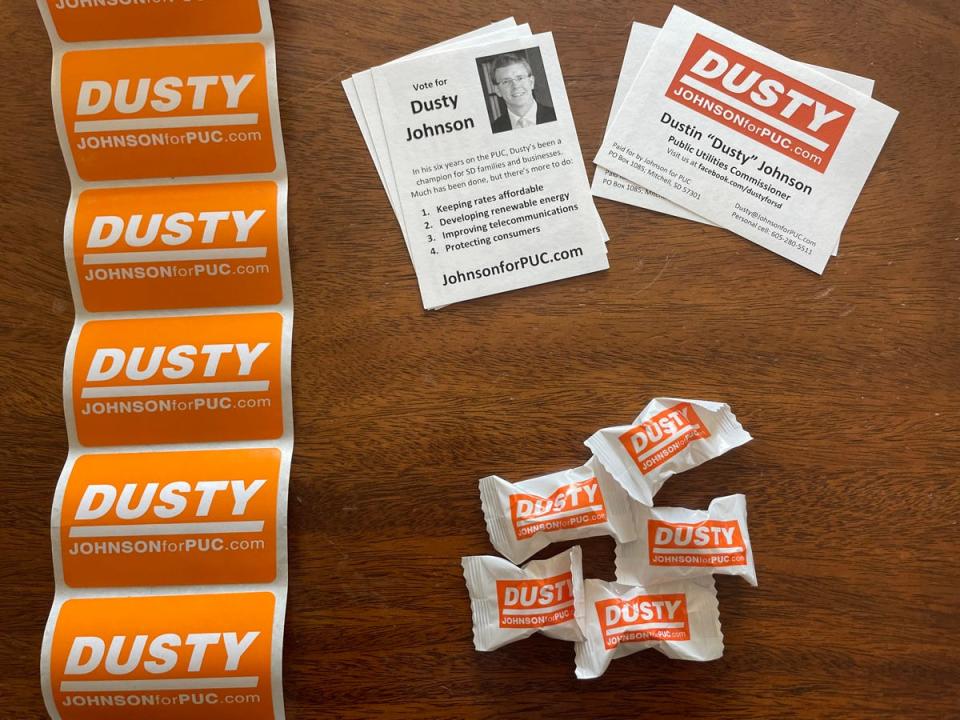Race for regulatory role puts Johnson in GOP spotlight
- Oops!Something went wrong.Please try again later.
- Oops!Something went wrong.Please try again later.
- Oops!Something went wrong.Please try again later.
- Oops!Something went wrong.Please try again later.
- Oops!Something went wrong.Please try again later.
This is the second in a four-part series by South Dakota News Watch about the political journey and Republican Party challenges faced by U.S. Representative Dusty Johnson:
When Republicans gathered in Dusty Johnson’s adopted hometown of Mitchell for their state convention in the summer of 2004, the race for Public Utilities Commissioner was not a major concern.
Party leaders had other priorities.
Despite Republicans holding a sizable lead in registered voters in South Dakota, the state’s congressional delegation consisted of three Democrats.
Tom Daschle was U.S. Senate minority leader. Tim Johnson had narrowly defeated Thune. And Herseth was in the U.S. House after winning a special election after Janklow was convicted for running a stop sign and killing a motorcyclist on a rural county road in August 2003.

Former state legislator Larry Diedrich geared up for a House rematch in the general election against Herseth, while Thune was mounting a Senate challenge to Daschle in what would become one of the most expensive and consequential races in state history.
Against this 2004 backdrop was the election for a seat on the three-person PUC, a constitutional office with staggered six-year terms that regulates electric, natural gas and telephone utilities.
The incumbent was 63-year-old Democrat Jim Burg, a former state legislator and National Guard officer seeking a fourth term after carrying 65% of the vote in 1998. Republican Carol Pitts had signaled a PUC run and then backed out, leaving the party without a candidate. With the support of GOP leader Joel Rosenthal, the 27-year-old Johnson put his hat in the ring and was unopposed at the convention, securing the nomination in a unanimous vote.
“If there had been anyone running against me at the convention, I probably would have lost,” said Johnson. “I was just a kid.”
Among those surprised at the nomination was Dennis Daugaard, a former state senator and Children’s Home Society chief executive who was serving as Rounds’ lieutenant governor. He saw Johnson as an effective campaign staffer well-versed in public administration. But the idea of him challenging a seasoned incumbent like Burg seemed far-fetched.
“I thought he was a sacrificial lamb, in all honesty,” Daugaard told News Watch. “I didn’t think he would have a chance.”
Democrats react to campaign: ‘We have our hands full’
Johnson acknowledged being self-conscious about his age and appearance as he entered the race. Political campaigns don’t always get beyond first impressions, and he worried about coming off as an eager-to-please accountant rather than a robust public statesman.
“Not exactly made for TV” is how Johnson puts it. Like a reverse JFK. But Rounds pulled him aside and gave him straightforward advice that became part of his political creed.
“He said, ‘Dusty, you have to be yourself,’” Johnson recalled. “And as I’ve gotten a little older, I understand that what voters appreciate almost more than anything is authenticity. I can tell when a politician is not being themselves, and I hold them with some disdain. I think they owe the voters a true look at who they are.”

It was his sister-in-law who suggested using a cardboard cutout of Dusty on the campaign trail, with the added touch of Johnson showing up and standing next to it to tell voters, “That’s me!”
It came off a bit corny, perhaps, but it felt right.
“I don't really like how most politicians run their campaigns,” said Johnson. “I think things tend to be too slick, and I just was always looking for a way to try to connect with people in a way that seemed a bit different. I think a lot of officeholders are a little too cool for school. That's never been my problem.”
The campaign revealed another of Johnson’s political rules: Never get outworked.
He gave himself a grueling schedule to all corners of the state, necessitating an unpaid leave of absence from the Rounds administration to make it work. He also used political connections to outraise his more established opponent $175,000 to $60,000.
Hustle and money helped, but it wasn’t the whole story. Though Burg noted that “it takes a while to learn the ins and outs of the job,” Johnson impressed industry insiders with policy chops on issues such as rural telecommunications and commercial trucking.
“(Burg) probably didn’t realize until September that he even had a race, and by then Dusty had already shaken about 40,000 hands,” said Rosenthal.
The momentum was clear at an October candidate forum, where Johnson held court on key PUC issues, going toe-to-toe with his opponent while sharing whimsical insights about life on the road during his maiden campaign.
Rosenthal recalls walking into an adjoining coffee shop after the forum and hearing a prominent Democrat talking to a companion about the race.
“We have our hands full,” the man said.
Keystone Pipeline controversy part of PUC experience
Johnson’s victory was 55% to 42%, a margin of 46,000 votes.
It was easily overshadowed at GOP headquarters by Thune’s historic takedown of Daschle and the re-election of George W. Bush to the White House. But among political insiders in South Dakota, Johnson’s campaign had an air of competence that made him someone to watch.
He threw himself into PUC duties at a critical juncture, focusing on emerging cellphone technology, wind turbines as economic development and more transparency from the commission, including documentation of correspondence with constituents.
As Johnson neared the end of that first PUC term, another South Dakota political shift was afoot.
Barack Obama won the White House in 2008, giving Democrats control over all three branches of the federal government. Obama’s landmark health care reform package in the face of a still-struggling economy energized Republicans for the midterms in 2010, especially in South Dakota, where Herseth’s U.S. House seat, ultimately captured by Noem, was seen as vulnerable.
One of those who saw Johnson as part of a potential GOP wave was Will Mortenson, a fellow Pierre native who studied political science at USD and briefly met the PUC commissioner when he visited campus.
Mortenson later interned in the state Legislature in 2009 and observed how Johnson engaged consistently with those around him, regardless of political standing.
“He was kind of a singular presence back then,” said Mortenson, who was elected to the Legislature in 2020 and became House Majority Leader in 2022.
“I had run into a lot of people who held elective office, all of whom seemed to take themselves very seriously. Dusty seemed to be a guy with his feet firmly planted on the ground, who talked to people he just met and to people who were his superiors with the same level of respect and excitement and humor.”
Mortenson, just 22 at the time, was full of ideas about how South Dakota Republicans could extend their reach, much of which centered on the upcoming election.
“I asked Dusty to go to lunch and pretty brazenly suggested he should run for Congress,” said Mortenson. “He told me that he was not going to do that, he was going to run for PUC again, and within a few days he offered me a job running his 2010 campaign.”
This article was produced by South Dakota News Watch, a non-profit journalism organization located online at sdnewswatch.org.
This article originally appeared on Sioux Falls Argus Leader: Race for regulatory role puts Johnson in GOP spotlight

